SEO takes a lot of time and resources. You need to invest in high-quality content creation, optimize your website, and build backlinks — plus all the firefighting that comes with Google core updates.
If you’re putting in so much effort to create a successful SEO strategy, it makes sense to check your results to see if your strategy is generating the expected ROI. That’s where measuring and reporting on keyword rankings come in handy.
What is SEO ROI?
SEO ROI stands for Search Engine Optimization Return on Investment. It’s a metric used to measure the effectiveness and profitability of an SEO campaign. Essentially, it quantifies the revenue generated from SEO efforts compared to their cost.
Why Measure SEO ROI?
Tracking the ROI of your SEO efforts allows you to:
1. Evaluate Your Strategy’s Effectiveness
Tracking SEO ROI is the best way to know if your strategy yields the desired results. SEO is a long-term game, and it’s pretty easy to fall into the trap of investing resources and waiting endlessly for results.
But with SEO ROI tracking, you can identify success markers to prove you’re making the right decisions. For example, you might not be ranking first for an important keyword yet. But if your ROI tracking shows you’ve climbed from the second to the first page of Google, it shows that your strategy is working to some extent.
2. Earn Client Trust
Rank tracking and reporting build trust as clients can see exactly what results they get from their investments.
A rank tracker like Keyword.com allows clients to see the same SEO dashboard you’re working from. They can see ranking changes in real-time, the search intent of the keywords they’re ranking for, and track historical SERP data.
When clients see that your decisions are based on real data rather than guesswork, they are more likely to trust your expertise and recommendations.
3. Boost Client Retention
Rank tracking allows you to show tangible results rather than just saying, “It depends.”
Even if the ultimate goal hasn’t been reached yet (e.g., ranking number one for a highly competitive keyword), showing progress (like moving up from the second page to the first) can be a strong indicator of an effective SEO strategy.
This evidence of performance reassures clients that their investment is bringing in positive results, even if it takes longer than initially expected.
How to Measure the ROI of Your SEO Efforts
To measure your SEO ROI accurately, you need to monitor your keyword rankings in real time and turn the data into an actionable SEO report. You’ll share this report with clients and internal stakeholders to prove the value of your SEO strategy.
This task can be daunting, especially for SEO managers or agencies who manage multiple websites with hundreds of thousands of tracked keywords.
The good news is that you can monitor rankings and generate SEO reports with Keyword.com easily and quickly. Keyword.com is a rank tracking software that helps businesses monitor how their web pages rank for specific keywords in search engine results. It’s easy to use, scalable and guarantees accurate results.
Let’s walk you through the process of tracking keywords and creating SEO reports with Keyword.com.
How to Track Keyword Rankings With Keyword.com
Step 1: Log into your Keyword.com account. You can sign up for a free Keyword.com account if you don’t have one.
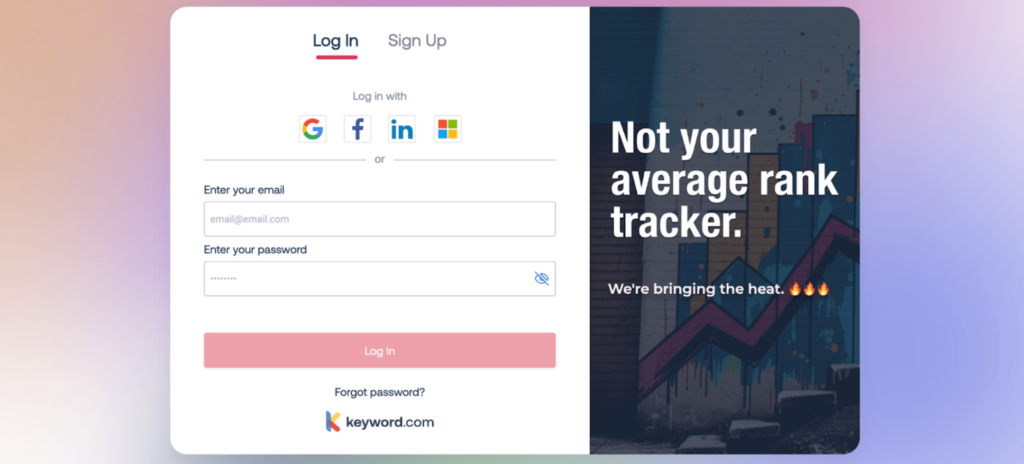
Step 2: Now, you should have access to your Keyword.com dashboard. Input your website’s URL to start setting up SEO tracking.

Step 3: Input or bulk import the keyword you want to track.
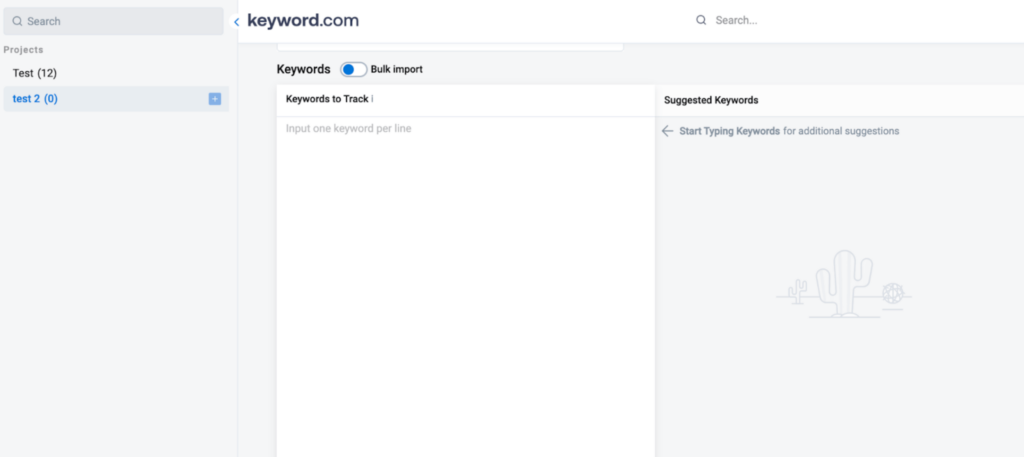
Step 4: Set up tracking parameters like location, language, and device. For local rank tracking, for example, enter the zip code of the specific location you want to see the search results performance and uncheck the “ignore local listing” option.
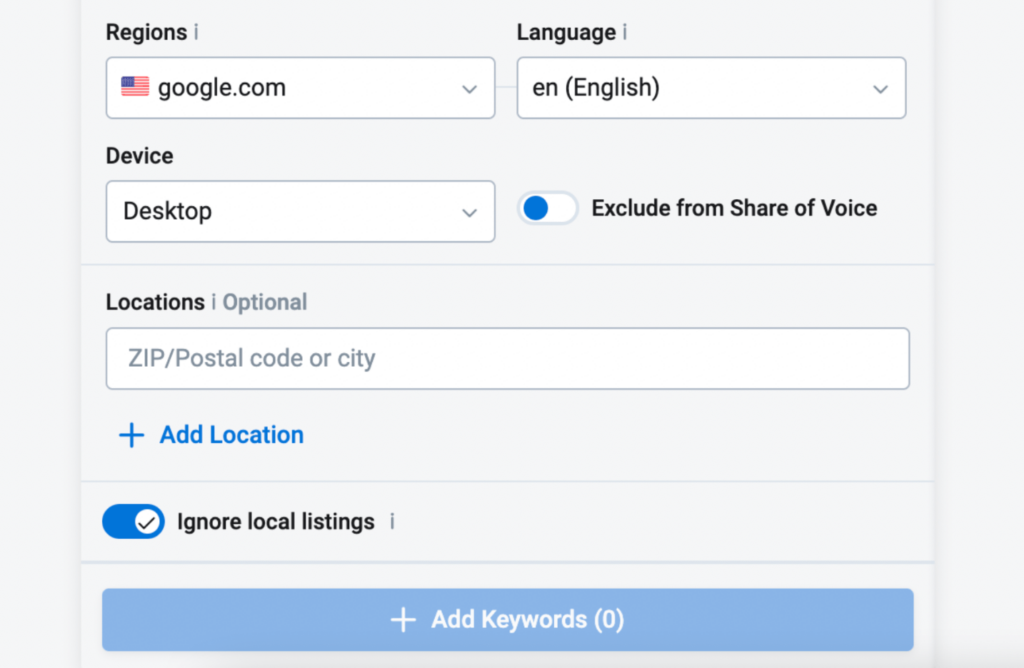
Step 5: After filling out the form, click “add keywords” to view your customized rank tracking dashboard. It will take a few minutes for the dashboard to update with real-time data. Once it’s ready, you’ll see a summary dashboard showing changes in keyword ranking over time.

You’ll also see a detailed breakdown of each keyword’s performance, including the SERP position, search intent, volume, cost per click, and SERP features.
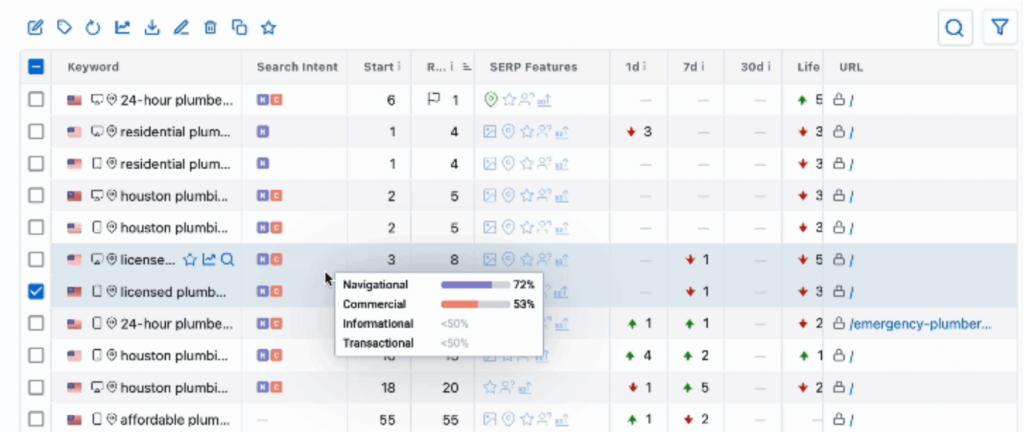
Now that you can see your SERP rankings, the next step is to create an SEO report reflecting your ranking data.
How to Generate an SEO Report With Keyword.com
Keyword.com provides two main options for creating and sharing SEO reports.
1. Export Ranking Data as a Separate File
Click on the “Export” button at the far-right corner of your dashboard, and select your preferred file format. Keyword.com lets you export rankings as TXT, PDF, and CSV files.
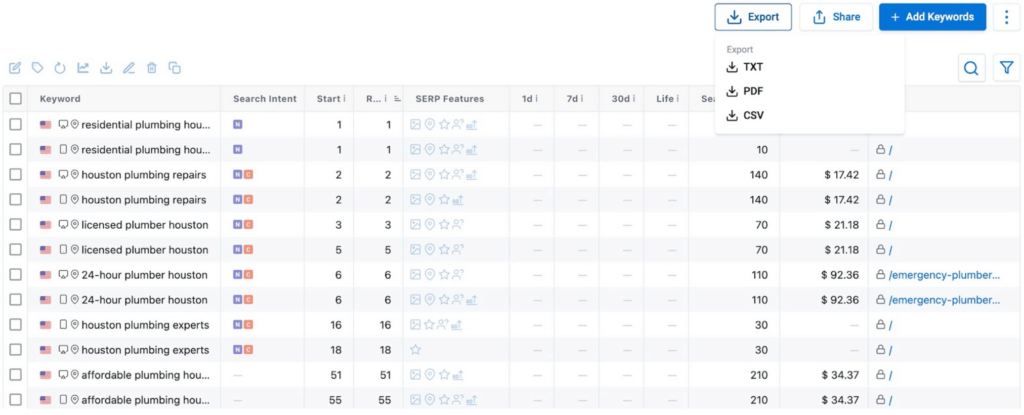
Pro tip: choose this option when you want to use Keyword.com’s accurate ranking data on an external data platform like DashThis.
2. Share Via viewKey Link
viewKey Link lets clients and external collaborators view a live version of your rank tracking dashboard. It aids transparency because stakeholders can see the same SEO data as you, which helps you win their trust.
Here’s how to set up viewKey Link:
1. Select the three dots at the far-right corner of your dashboard. Then click on “viewKey Project Settings.”
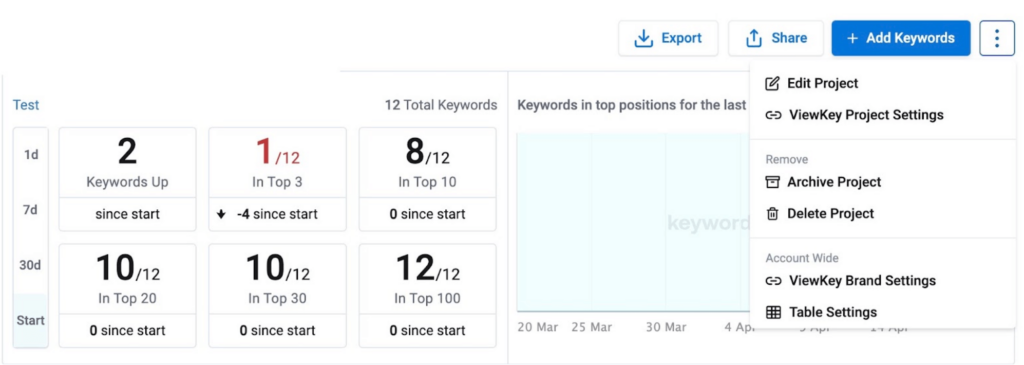
2. Set up sharing parameters for the viewKey Link dashboard. For example, you can add a password so that only authorized users can access the SEO report.
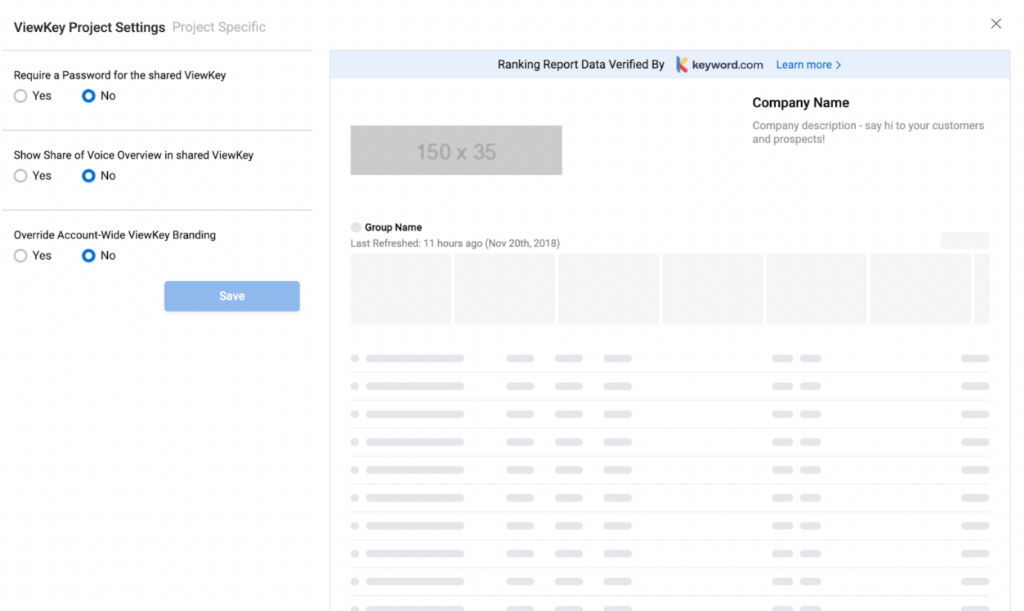
3. Customize your brand information, such as your company website, logo, and description, to create a white-label SEO report.
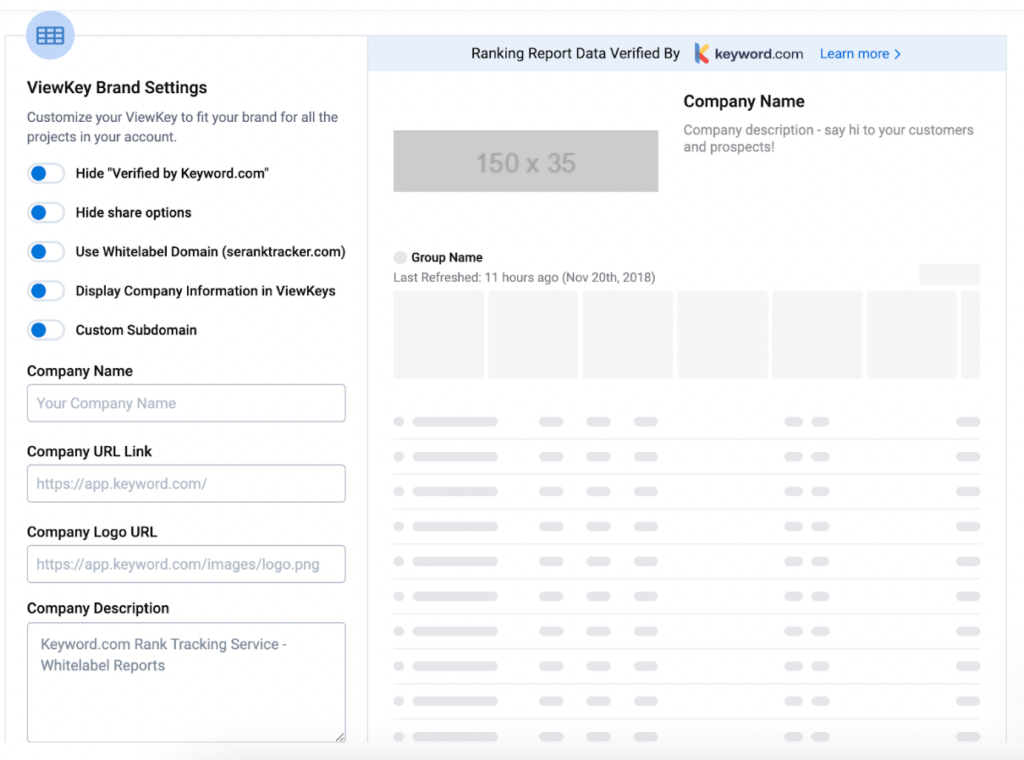
4. Go back to the share page and copy the viewKey URL.
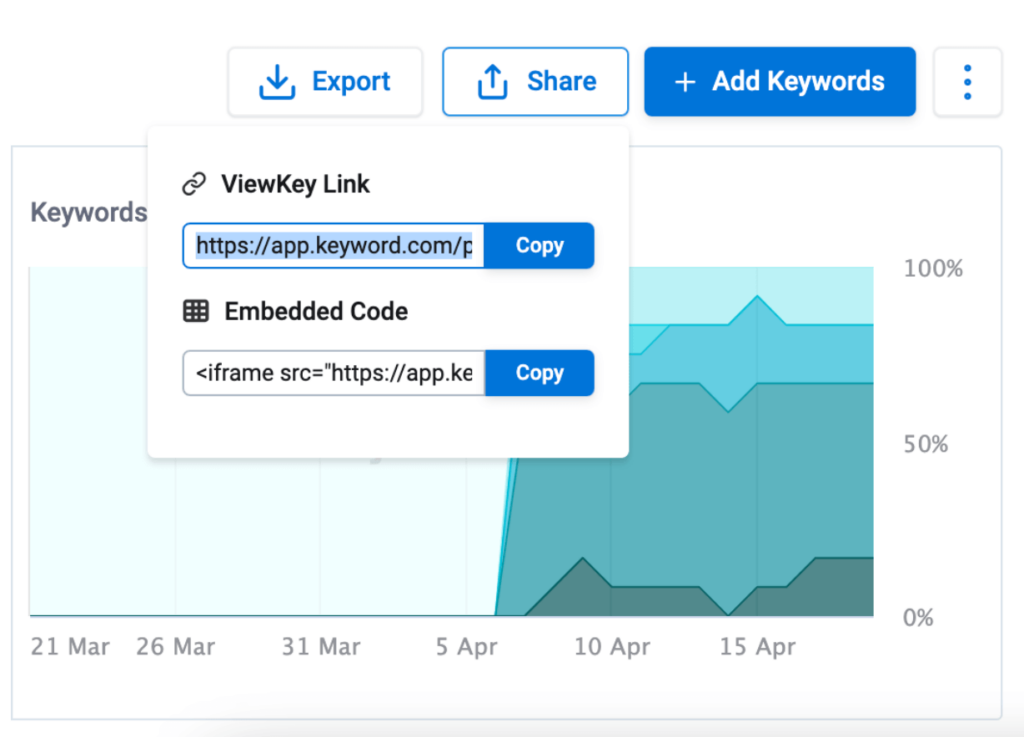
Anyone with this link will be able to view the live version of your keyword tracking dashboard.
Learn more: SEO Reporting: The underrated hack to 3X your agency’s revenue
Tips for Boosting Your SEO Performance and ROI
Here are a few ways to improve your website’s organic search performance and generate more ROI from your SEO efforts.
- Create high-quality content: ensure your content is engaging, informative, and matches your target audience’s search intent. High-quality content is more likely to rank well and attract backlinks, which are crucial for SEO.
- Build backlinks: this tracks closely with our earlier point. Backlinks from reputable sites signal to search engines that your content is valuable and trustworthy. Focus on creating content that naturally attracts links and consider reaching out to related websites for guest posting opportunities.
- Optimize your website for user experience (UX): Sites that are easy to navigate tend to perform better in search rankings. Ensure your website has a clear hierarchy and easy-to-read content to minimize bounce rate.
Measure and Report SEO Rankings Accurately With Keyword.com
Keyword.com is the most accurate rank tracker for agencies, enterprise businesses, and in-house SEO teams. It offers top features like:
- Local SEO tracking: monitor your SEO performance for specific geographical locations and zip codes.
- GSC integration: connect your Keyword.com account to Google Search Console for a more robust SEO tracking dashboard.
- Share of voice data: see what percentage of the SERPs your brand owns for your most important keywords and search queries.
And that’s not all.
Sign up for a free trial to try all of Keyword.com’s rank tracking features. Start your free 14-day trial.